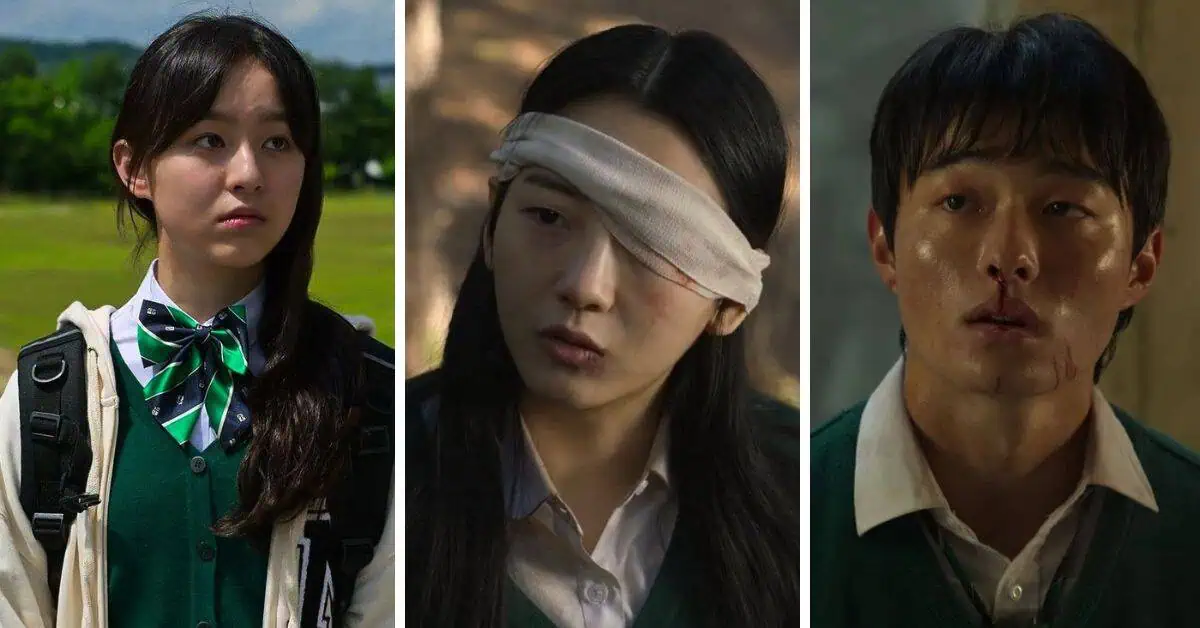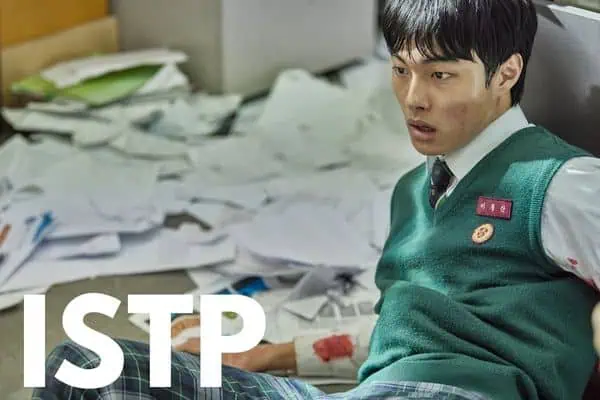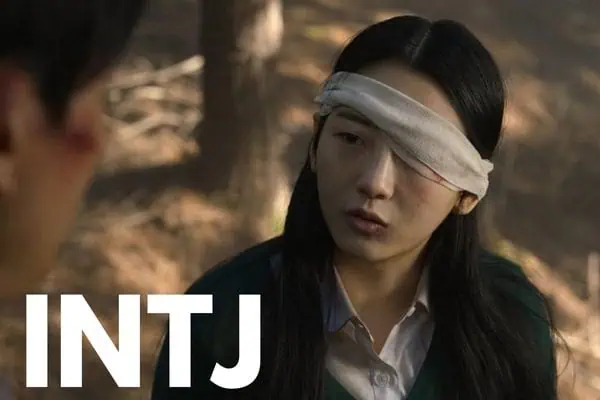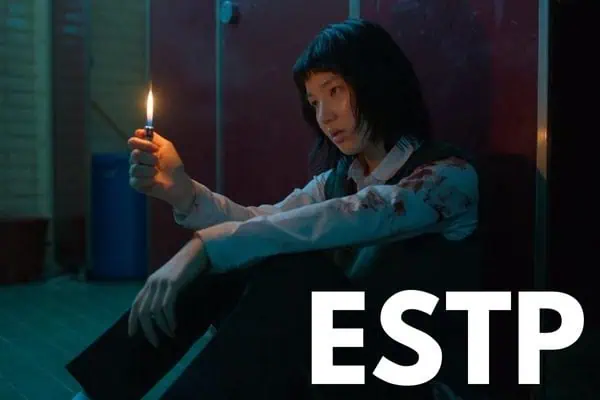If you’ve ever thought, “high school is hell”, this show takes that statement and says, “Cool, let’s make it literal.” All of Us Are Dead drops a bunch of teenagers into a zombie outbreak and forces them to survive with nothing but hormones, half-baked escape plans, and a cafeteria full of questionable decisions. It’s messy, terrifying, and kind of beautiful in that way where you realize most people are just barely keeping it together even when the world isn’t ending.
And because I’m me, I couldn’t watch without thinking about personality types. Like, which MBTI® survival strategy is this kid unconsciously roleplaying while getting chased down by the undead? Some hoarded knowledge of cognitive functions has to be useful in a zombie apocalypse, right? At least, that’s what I tell myself at 2am while spiraling down the “what ifs.”


So let’s talk about these characters. First up: Lee Cheong-san.
Not sure what your personality type is? Take our personality questionnaire here. Or you can take the official MBTI® here.
Estimated reading time: 22 minutes
Lee Cheong-san: ISTP


If you’ve ever known an ISTP, you already know the vibe: practical, quick on their feet, allergic to unnecessary drama (unless it’s sarcasm, in which case, pour another round). Cheong-san is the poster child for this type, only with the added bonus of sprinting cardio that could shame a marathoner. He’s not the guy giving pep talks or making flowcharts, he’s the guy tying a fire hose to the window and saying, “I don’t know, let’s try not dying today.”
Like most ISTPs, Cheong-san volunteers first, runs headlong into danger, and pulls off stunts that make you want to scream, “Do you value your life?” But that’s the thing about ISTPs: they do value it, they just also trust their instincts and reflexes way more than most people trust… well, anything.
Emotionally, he’s more guarded than most. Feelings are shoved behind a wall of wit and sarcasm, like “Haha, I’m fine” while quietly bleeding out on the inside. He cares deeply—especially about On-jo—but he shows it through action, not words. Protecting her, protecting the group, wanting to say more, but not feeling sure.
Cheong-san’s arc hurts because he embodies that ISTP contradiction: he wants connection, but he can’t always say it out loud until it’s too late. He’s noble, tragic, and deeply human in all the complicated, confusing ways a high schooler can relate to.
Choi Nam-ra: INTJ


Nam-ra starts the series the way most INTJs start life: misunderstood, slightly feared, and carrying the unasked-for burden of being “responsible.”
While everyone else is panicking, crying, or confessing crushes like there’s no tomorrow (because, technically, there might not be), Nam-ra is calculating patterns, listening for frequencies the rest of the group can’t hear, and predicting the military’s next move. She’s got that big-picture vision INTJs are famous for—spotting probabilities, weighing long-term outcomes—but try explaining that to a bunch of traumatized teenagers who just want to hear, “It’s fine, we’re fine.” Optimism is not her love language.
Her “halfbie” status feels like a metaphor INTJs didn’t ask for but secretly relate to—half in the world, half outside of it, struggling between logic and the more monstrous urges of humanity, trying not to devour the people they actually care about. She holds on longer than anyone expects because she’s stubborn, disciplined, and fiercely protective once she decides you’re in her inner circle.
Nam-ra is the INTJ apocalypse archetype: sharp, strategic, unnervingly calm, half-villain if you don’t know her, reluctant protector if you do. She’s the one who will not only help you survive but will also leave you with the uncomfortable realization that she was right about everything, and you were too busy crying to notice.
Park Mi-jin: ESTP


If Cheong-san is “reckless but noble,” Mi-jin is “reckless but doesn’t care if you think she’s noble.” She’s the ESTP survival package: sharp tongue, quick reflexes, and the kind of gallows humor you only develop when your Plan A, B, and C all got eaten by zombies. She’s not here to sugarcoat anything. If you’re whining, she’s telling you to shut up. If you’re slowing her down, she’s already five steps ahead.
But underneath the sarcasm and chain-smoking “I couldn’t care less” vibe, she’s loyal in that ride-or-die way. When her friends are in danger, she throws herself into the mess without stopping to weigh the odds. That’s the ESTP paradox: they look like adrenaline junkies, but really they’re deeply tethered to the people they love, acting first and processing the emotions later (if at all).
Mi-jin’s arc is ESTP energy distilled: blunt to the point of rudeness, clever when it counts, loyal in the moments that matter most. She’s the person you want at your side in a fight partly because she’ll get you out alive, partly because if you die, she’ll make sure your eulogy is both brutally honest and kind of funny.
Lee Su-hyeok: ENFJ


Every group trapped in a death maze of zombies needs one thing: the charismatic guy who looks like he was born to star in a K-drama. That’s Su-hyeok. He’s the ENFJ of the crew, and it shows. He’s magnetic, endlessly loyal, charming, and somehow manages to make even “I used to be a bully” sound like a heartfelt redemption arc.
ENFJs are wired to be the glue, and Su-hyeok is constantly trying to hold everyone together with empathy and sheer force of will. ENFJs can read the room like it’s a second language, but they also can’t stop themselves from narrating the subtext. Sometimes that’s comforting; sometimes it makes you want to say, “Bro, please, I know I’m scared, you don’t have to make it a group therapy session.”
What sets him apart, though, is that he also backs up his words with action. He throws himself into fights that should’ve killed him ten times over because protecting people is hardwired into him. And let’s be honest: half of those people could not have made it two minutes without him playing human shield. He’s the guy you want swinging a baseball bat when the dead come knocking.
And then there’s Nam-ra. Of course the ENFJ falls in love with the icy class president. It’s a tale as old as time: extroverted heartthrob meets brooding genius, decides her walls are a puzzle worth solving, and then promptly dedicates his entire existence to making sure she doesn’t devour their friends. Their love story is peak ENFJ; he sees her potential, refuses to give up on her, and chooses connection even when it could kill him.
Su-hyeok is ENFJ energy in its purest form: charismatic, self-sacrificing, annoyingly good at reading people, and determined to drag everyone toward hope whether they want it or not.
Lee Byeong-chan: INTJ


Byeong-chan looked at the school’s utter indifference to his son’s suffering and said, “Fine, I’ll build my own evolutionary advantage, with genetic horror.” It’s the INTJ tendency toward long-term, big-picture solutions taken to the most catastrophic extreme. After all, why yell at the principal one more time when you could bioengineer a virus to rewrite the laws of fear?
That’s INTJ logic when it’s a bit….unhealthy. Ruthless pattern recognition and problem-solving, detached from the human consequences. He wasn’t trying to end the world; he was trying to end his son’s torment. But INTJs don’t stop at surface fixes, they go down to the foundations, rip out the rot, and rebuild. Unfortunately, when you’re grieving, furious, and brilliant, “rebuild” sometimes translates to “accidentally create the apocalypse.”
Byeong-chan is the INTJ shadow made flesh: brilliant, strategic, isolated, and dangerous because his solution worked too well. He’s both the architect of destruction and the man trying to stop it, living proof that an INTJ with a wounded heart can be just as terrifying as any horde of zombies.
Yoon Gwi-nam: ESTP


If Park Mi-jin is the ESTP you want on your apocalypse team, Gwi-nam is the ESTP you get when natural charm and quick thinking get swallowed whole by insecurity and cruelty. He’s the ESTP bad guy: fast, adaptable, cunning, but driven entirely by ego and sadism. It’s not about survival for him, it’s about dominance. The apocalypse just gave him the stage.
Even before the virus, Gwi-nam had that ESTP charisma twisted into something ugly. He wasn’t the leader of the bullies, but he played the role of enforcer; the one doing the dirty work, half to prove himself, half to avoid being the punching bag. That’s the dark ESTP loop: desperate for respect, terrified of being seen as weak, they lean into cruelty as a performance. Throwing people to zombies, killing for sport, mocking classmates while teachers turn a blind eye; it’s all Gwi-nam trying to claw back control in a world where he never really had any.
And then he becomes a “halfbie.” Suddenly, the ESTP’s natural gift for reading situations, reacting instantly, and pushing the limits of their body gets dialed up to horror-movie supervillain levels. He learns faster than anyone else how to kill zombies. He moves like he’s been training for this apocalypse since birth. He clings to his knife like it’s his personality. But instead of channeling that power into protecting people, he funnels it all into a vendetta against Cheong-san, because what’s more ESTP than turning the end of the world into a personal grudge match?
Nam On-jo: ISFP


ISFPs are often underestimated, and On-jo fits that to a T. She’s the girl who’s more worried about confessing to her crush than the grades she’s tanking, the one who kicks Cheong-san in the leg when he annoys her, who looks soft and ordinary until the apocalypse hits, and then suddenly she’s using her firefighter dad’s training to improvise weapons, climb ropes, and think up escape plans. That’s the quintessential ISFP: quiet until you need them, underestimated until they’re the reason you’re still breathing.
Her loyalty is devastating. The universe keeps ripping away every anchor she has. And still she doesn’t shut down. She grieves, she cries, but she doesn’t collapse. She channels her pain into protecting whoever’s left. ISFPs love deeply and quietly, but when that love is threatened, they turn into steel. On-jo may not have the raw power of Su-hyeok or Nam-ra, but her endurance is emotional. She’s the hope that doesn’t burn out, even when everything else is ash.
Kim Ji-min: ISTJ


I was surprised how many people absolutely detested Kim Ji-min. Yes, she could be grumpy and self-centered at times, but ultimately, who wouldn’t be in that situation?
Truth be told, ISTJs aren’t built for chaos, they’re built for systems. And Ji-min’s tragedy is that every system she trusted collapses one after another. First her school, then her friendships, then the government, and finally, her parents. That’s the ISTJ nightmare: realizing that all the rules you followed, all the structures you trusted, never really protected you.
You can see her ISTJ strength and fragility collide in how she copes. She doubles down on duty—recording videos, vowing to kill every zombie in her parents’ memory, helping with barricades, holding tarps, trying to keep things orderly even when she’s falling apart inside. But the grief eats at her. She lashes out, questions the fairness of it all, and in her worst moment, abandons her best friend. That’s the dark side of the ISTJ under extreme stress: tunnel vision, fear overriding loyalty, the inability to improvise when their internal framework collapses.
Ji-min is heartbreaking because she is so human. She wants her mother’s soup. She wants to go back to the life she sabotaged out of teenage stubbornness. She wants the world to be fair, and when it isn’t, she breaks. ISTJs carry their duty like armor, but Ji-min shows what happens when that armor finally cracks. She fought hard, worked tirelessly, but in the end, her grief was heavier than her discipline.
Min Eun-ji: ISFP


ISFPs are often called artists, healers, quiet rebels who want nothing more than to live authentically. Eun-ji is the version you get when the world crushes that spirit under constant humiliation, and instead of blooming, it rots. She’s the ISFP shadow: vulnerable, wounded, desperate to reclaim control over her own body and story in a place where both have been relentlessly violated.
Before the outbreak, Eun-ji is already a ghost in her own life. She’s shy, quiet, ostracized. Bullied until she believes the entire school is complicit in her suffering. For ISFPs, betrayal cuts deep, because their entire identity orbits around authenticity and trust. Once they decide you’re fake, you’re done. The apocalypse hands her the teeth to bite back.
And she does. After becoming a halfbie, her ISFP sensitivity curdles into obsession. She destroys every phone she can find, ends the dean (somewhat justifiably), and lights the fire to burn the school down. That’s the ISFP idealism inverted into nihilism: if this world humiliated me, then let the whole world burn.
Eun-ji is the ISFP’s dark mirror: empathetic sensitivity turned into rage, artistic selfhood consumed by humiliation, and authenticity weaponized into self-destruction. She’s heartbreaking because you can still see the echoes of who she could have been, a girl who just wanted to be left alone, to be seen, to be safe. Instead, she becomes a reminder that even the softest personalities can harden into something monstrous when the world won’t stop breaking them.
Song Jae-ik: ESFJ


At first glance, Jae-ik comes off like your classic “tough cop” stereotype: gruff, skeptical, and already tired of your excuses before you’ve even opened your mouth. But peel back the layers (and the zombie horde), and what you find is a walking ESFJ survival manual, duty-bound, protective, a little bossy, but ultimately willing to risk everything for the people who end up under his wing.
ESFJs are caretakers by instinct, and Jae-ik cannot not take care of people. He saves Ho-chul, rescues a terrified little girl, insists on going back for a stranger streaming on a rooftop when every ounce of common sense says, “leave him, he’s content fodder.” But Jae-ik treats everyone like they’re his responsibility, even when they drive him crazy.
What’s fascinating is how his harshness masks his heart. He interrogates Byeong-chan like a man with zero sympathy, but when Byeong-chan sacrifices himself, you can see that it changes him. After that, he’s carrying on Byeong-chan’s mission, making sure the laptop gets to the right hands. For an ESFJ, loyalty doesn’t die with you. If you mattered to them, they’ll carry your burden as if it were their own.
Jang Ha-ri: ISTJ


Ha-ri doesn’t cling to empty hope, she says outright that she doesn’t trust the government, and she’s right. She knows systems fail, so she builds her own: barricades, stretchers, strategies.
While we don’t see as much of Ha-ri’s personality as certain other types, I still believe ISTJ is the best fit for her. She’s pragmatic, serious, often harsh, but deeply devoted. She’s the steady archer holding the line, the older sister willing to burn herself out to protect what family she has left. And in the end, she’s the reminder that ISTJs don’t survive because they’re unfeeling, they survive because they love so hard it turns into duty, and they refuse to abandon that duty, no matter how many times the world tries to break them.
Oh Joon-yeong: ISTJ


Joon-yeong’s steady mind and quiet discipline keep the group alive more times than anyone admits. He’s not swinging bats or firing arrows; he’s wiring up drones, hooking cameras to TVs, and creating sound distractions with whatever scraps he can jury-rig.
Like a lot of ISTJs, he’s not the bravest in terms of charging forward into danger, but courage doesn’t always look like recklessness. For him, it’s staying calm, staying focused, and doing the work nobody else can.
There’s also that ISTJ undercurrent of quiet competition and pride. He admits, with a little honesty, that he was always jealous of Nam-ra’s grades. ISTJs often look to external measures of success as confirmation that they did “enough.” There’s more I could say, and I really deliberated between ISTJ and INTP, but I saw him relying far more on what he’d learned and studied in the past rather than improvising and brainstorming out loud in order to find outside-the-box solutions.
Yang Dae-su: ESFP


Every survival group needs one: the ESFP who keeps everyone laughing when they should be screaming. Dae-su is that guy. Choir kid, wannabe singer, master of terrible timing. In a world collapsing into blood and ash, he’s the reminder that you’re still alive enough to laugh.
Like most ESFPs, he lives in the moment, too much sometimes. Blurting out inappropriate jokes, chasing attention, accidentally saying the wrong thing at the absolute worst time. But under that chaos is his real gift: he grounds people in the present. When despair is eating them alive, he cracks a joke. When silence is suffocating, he fills it with music. When fear threatens to freeze everyone, he’s the one to say, “Fine, I’ll go first.” ESFPs don’t do well waiting around—they’d rather risk it than rot in fear. He steps into danger when his friends need him, even if he masks it with a grin. That’s the ESFP heart: loyal, impulsive, and willing to bleed if it means their people make it through.
Seo Hyo-ryeong: ISFJ


Hyo-ryeong is the friend who’s always there, even if she’s not always loud about it. She’s the ISFJ who notices when you’re falling apart, the one crying in the corner but still reaching out to hold your hand because that’s all she can give right now. Maybe she’s not a warrior or a strategist. But she’s the human reminder of why surviving even matters.
ISFJs tend to carry grief in silence, and Hyo-ryeong does it constantly. She cries for Na-yeon, even though Na-yeon betrayed them. She’s not confrontational, and she knows it. She doesn’t fight Gwi-nam. She doesn’t argue loudly. But she still shows up in quieter ways; holding a tambourine to distract zombies, standing at Ji-min’s side even when she doesn’t know how to help, asking gently if others think more survivors might be out there.
Hyo-ryeong won’t be remembered as the bravest fighter or the one with the most daring plan. But that’s not her role. She’s the one who mourns, who offers gentle support, who reminds you that being human in a nightmare is an act of defiance in itself.
Nam So-ju: ISTP


Nam So-ju is the ISTP dad archetype cranked up to eleven: stoic, resourceful, emotionally distant, but underneath it all? Fiercely devoted. He’s the kind of man who can MacGyver a survival path through hell with a shotgun in one hand and a roll of caution tape in the other. You may not hear them say “I love you,” but you’ll find yellow markers leading you out of the mountain alive.
ISTPs hate being boxed in by rules, which is why he doesn’t last five minutes in quarantine before peacing out. He’s got a daughter in a death trap, and bureaucrats telling him to wait his turn? Not happening. The ISTP motto might as well be: “Screw your protocol, I’ll save her myself.”
Park Sun-hwa: ENFJ


If there’s ever been a teacher who deserved sainthood, it’s Ms. Park. She’s the ENFJ in full bloom: insightful, deeply empathetic, running herself ragged trying to save everyone else even as the apocalypse chews at her heels. She’s the one corralling terrified teenagers, soothing frayed nerves, and still finding time to remind them of their worth. Even when her authority is slipping, even when betrayal guts the group from the inside, she leans on compassion.
Park Eun-hee: ISTJ


Assemblywoman Park Eun-hee is the ISTJ politician you actually wish was running your district. Pragmatic, grounded, unshakable, and allergic to BS. Where others flail in chaos, she defaults to: What’s the procedure? What’s the duty? What’s the rule that saves the most lives? It’s not glamorous, but it’s what keeps order when everything else is ash.
She’s rigid sometimes, insisting So-ju stay with the group when every fiber of him screams “save my daughter.” But she is logical: the rules matter because lives depend on consistency. She’ll sacrifice comfort, power, and even her career (ripping up her resignation letter in her party leader’s face) because ISTJs don’t bend their principles for optics. They do what’s right because it’s right, even if it costs them everything.
Jin Seon-mu: ENTJ


When the outbreak spirals into chaos, Seon-mu definitely has feelings about it, but he has to put that aside. He calculates, he commands, and he acts. Shut down communications? Done. Abandon survivors because one halfbie might compromise the mission? Brutal, but to him, necessary. Bomb an entire city? If it preserves the rest of the country, he’ll sign the papers.
Seon-mu is not a sadist — he doesn’t enjoy any of this — but he believes history is written by those who do what squeamish people can’t. His loyalty isn’t to individuals but to the larger system, the nation, the survival of the many.
And yet, what makes Seon-mu tragic instead of monstrous is that he’s not immune to what he’s done. ENTJs can lock their feelings away long enough to execute the impossible, but when the dust settles, the guilt seeps in. Yes, he sees the bigger picture and is going to do what it takes to ultimately save the most people. But the guilt is too much. Once everything quiets down, his introverted feeling side (the ENTJ’s inferior function) will remind him that he violated his own conscience for the greater good.
He’s the ENTJ paradox in sharp relief: capable of immense vision, terrifyingly decisive, but carrying the unbearable weight of the choices no one else would dare to make.
Han Gyeong-su: ESFP


Gyeong-su is the ESFP kid from the wrong side of town. He’s impulsive, rough around the edges, sometimes too quick with his hands, but at his core? He just wants to belong, to matter, to make his friends laugh even when everything else feels unbearable.
His ESFP traits flare in every crisis moment. Zombie dangling out the window? He doesn’t hesitate—he’s the first one swinging with a broom, blood rushing, adrenaline sparking, and sometimes sacrificing perfectly good computers for the cause. ESFPs like Gyeong-su are wired for action. They don’t wait for someone else to step up. They move, even recklessly, because standing still feels like death.
What makes his story so painful is that his openness and vulnerability—two ESFP gifts—become the wedge Na-yeon exploits. ESFPs are the life of the party, the ones who love the loudest, but they’re also sometimes the easiest targets when fear looks for a scapegoat.
I cried so hard at his death; like ugly, choking sobs. I don’t know if I’ve ever watched a betrayal that hit so deep. Tell me in the comments if you felt the same!
What Do You Think?
Which characters do you relate to most? Which characters did you despise the most? Let me and other readers know in the comments!
Find out more about your personality type in our eBooks, Discovering You: Unlocking the Power of Personality Type, The INFJ – Understanding the Mystic, The INTJ – Understanding the Strategist, and The INFP – Understanding the Dreamer. You can also connect with me via Facebook, Instagram, or Twitter!